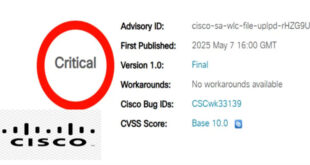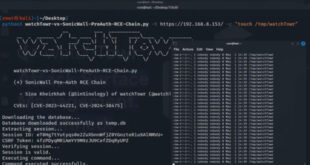Qualcomm’s October 2024 Security Bulletin reveals critical vulnerabilities in several chipsets, including the popular Snapdragon mobile platforms and FastConnect solutions. These issues impact various system components like WLAN, DSP, and graphics, posing serious security risks to users globally.
CVE-2024-43047 (CVSS 7.8) is a vulnerability identified by Google’s Threat Analysis Group (TAG) as possibly being exploited in a limited, targeted manner.
By infosecbulletin
/ Friday , May 9 2025
Microsoft has fixed critical vulnerabilities in its core cloud services, including Azure Automation, Azure Storage, Azure DevOps, and Microsoft Power...
Read More
By infosecbulletin
/ Thursday , May 8 2025
The cyber threat landscape is rapidly changing, with a notable increase in ransomware activity in April 2025, driven by the...
Read More
By infosecbulletin
/ Thursday , May 8 2025
SonicWall has released patches for three security flaws in SMA 100 Secure Mobile Access appliances that could allow remote code...
Read More
By infosecbulletin
/ Thursday , May 8 2025
From April 2024 to April 2025, Flashpoint analysts noted that the financial sector was a major target for threat actors,...
Read More
By infosecbulletin
/ Thursday , May 8 2025
Cisco has issued a security advisory for a critical vulnerability in its IOS XE Software for Wireless LAN Controllers (WLCs)....
Read More
By infosecbulletin
/ Wednesday , May 7 2025
Attackers linked to the Play ransomware operation deployed a zero-day privilege escalation exploit during an attempted attack against an organization...
Read More
By infosecbulletin
/ Wednesday , May 7 2025
Hackers are exploiting an unauthenticated remote code execution vulnerability in the Samsung MagicINFO 9 Server to take control of devices...
Read More
By infosecbulletin
/ Tuesday , May 6 2025
CISA added the Langflow vulnerability, CVE-2025-3248 (CVSS score 9.8), to its Known Exploited Vulnerabilities catalog. Langflow is a popular tool...
Read More
By infosecbulletin
/ Tuesday , May 6 2025
Google has released its monthly Android security updates, addressing 46 vulnerabilities, including one that has been actively exploited. CVE-2025-27363 (CVSS...
Read More
By infosecbulletin
/ Tuesday , May 6 2025
The Cyber Security Club, representing the Department of Computer Science and Engineering at the University of Asia Pacific (UAP), has...
Read More
“There are indications from Google Threat Analysis Group that CVE-2024-43047 may be under limited, targeted exploitation. Patches for the issue affecting FASTRPC driver have been made available to OEMs together with a strong recommendation to deploy the update on affected devices as soon as possible,” Qualcomm wrote in its security bulletin.
A serious vulnerability (CVE-2024-33066, CVSS 9.8) in the WLAN Resource Manager could let attackers remotely execute harmful code, risking a complete device takeover. This issue, caused by improper input validation, allows memory corruption by redirecting log files. Affected chipsets include Immersive Home Platforms, IPQ series, QCA series, and Snapdragon X65 5G Modem-RF systems.
A high-severity vulnerability (CVE-2024-23369) in the HLOS (Hardware Abstraction Layer Operating System) allows local attackers to exploit memory corruption by manipulating FRS/UDS buffers. This affects Snapdragon mobile platforms, FastConnect series, and QCA series.
The October bulletin discusses various vulnerabilities in open-source software, including a buffer over-read issue in WLAN Host Communication (CVE-2024-33064) that may lead to denial of service or sensitive information leaks.
Qualcomm urges OEMs to quickly apply necessary patches to protect users. Users should update their devices to the latest firmware and check with their manufacturers about patch status for their specific models.
 InfoSecBulletin Cybersecurity for mankind
InfoSecBulletin Cybersecurity for mankind















